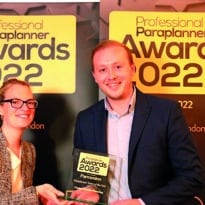Challenging, professional, enjoyable – Peter Cross (on the right) describes his role as paraplanner for London Wall Partners and tells of his passion for helping clients with their financial planning, investment management and philanthropy
Pensions transfers and retirement planning have become something of a specialism for Peter Cross in his role at London Wall Partners.
“We are dealing with people pre and post retirement and are currently seeing much more interest in pension transfers,” Peter says. “As mentioned in Kim Bendall’s article in the December issue of Professional Paraplanner, now there are a number of reasons why DB pensions should very much be taken into consideration when reviewing a client’s financial plan. In fact, we took out a full page advert in the Financial Times in the summer to encourage individuals to find out their CETV, because for some it may be appropriate to consider transferring – in the context of their overall financial situation and objectives.”
In addition, he says, following the recent changes to pensions legislation, and the reduction in CGT rates, there is a need “to challenge the way people think about their retirement planning”.
Most notably, this is in the way clients utilise their assets to meet their needs, with retirement planning and estate planning becoming even more inter-connected following the changes to the taxation of pension death benefits.
Peter explains: “Often individuals automatically equate retirement with pensions, and drawing income from pensions, because that is seen as the norm. We believe that what people need in retirement is cash, rather than ‘income’. As such, retirement planning is really about how to generate the cash needed in an efficient manner – for example, disposing of taxable assets at a CGT rate of c.20% rather than drawing pension income at 40% or 45%, which can also have the benefit of preserving pension assets that could be passed on in a tax efficient manner.
“Often people are not thinking in this way. But once you’ve explained the rationale, and how it can make a difference to their tax situation and to their ongoing lifestyle, it makes sense to them and we find clients really appreciate that we are thinking around this issue.”
Trainee paraplanner
Having always liked the idea of helping people with their money, after attaining a degree in economics from Cambridge University, Peter responded to an email advertising a role in a local IFA, and so discovered financial planning. “After doing some research in preparation for my interview, I realised that it was something that I would enjoy, and would suit my skills and desire to help people.”
That first role was as a trainee paraplanner at The Harvest Partnership, a small, family-run firm based in Bromley, Kent. He started in September 2009, just as the markets were just beginning to recover from the financial crisis.
“I am so grateful for the grounding that it gave me; dealing with a broad range of clients and many different products, both old and new,” Peter says.
After four years with the firm, during which time he achieved his Diploma, he felt the need to stretch himself and to gain a wider experience of financial planning.
“I was introduced to London Wall Partners through a recruitment consultant, and was highly impressed by the ethos, resolute independence and desire to give a first class service to clients,” he says.
He joined the firm in November 2013. “It was a step up in quality and professionalism, which was challenging, but I have benefitted greatly and I feel like I have developed so much since being here. My technical knowledge has been stretched and improved significantly. It’s also been really enjoyable. It’s all about building long-term relationships with clients and it’s great to be part of a team of like-minded people, who work together to serve each other and our clients.”
A growing company
London Wall Partners has been growing its client base in recent months. “We are expanding and growing, both in staff and the number of clients, which is very exciting,” Peter says. The firm is currently recruiting, and would be pleased to speak with any paraplanners interested in joining a City of London firm.
Based literally on London Wall, the firm’s client base predominantly consists of accountants, lawyers, entrepreneurs that have sold or are in the process of selling their business, families and trusts. It’s high-end work and Peter serves a number of clients, who receive reviews every 6 or 12 months.
Peter works directly for the founder and senior partner of the firm Nick Fletcher, who sings Peter’s praises. “As a firm we’ve always been fee based and looked to do the very best for our clients. We see the role of the paraplanner and other members of the team as being as important to the service to the client as the adviser and we recognise talent when we see it. Peter has proved a valuable addition to the firm, which is reflected in his role and the trust we place in him.”
Explaining the way that the firm works, Peter says: “It is very much a team basis. For example, while Nick or one the other partners may have the most responsibility for communicating with clients, the whole team works closely together on the deliverables, which utilises the respective skills of the financial planners, paraplanners, the investment team, and the operations team.
“We tend to refer to ourselves as Assistant Financial Planners as we believe the term is easier for clients to understand. It also helps engage with people outside the industry, which is good for the firm and helps us promote financial planning as an attractive career path” he explains.
There is also a graduate trainee paraplanner programme, with new recruits having a research and support role. They make direct contact with the providers, obtaining valuations and other information and passing that through to the paraplanners, who devise and discuss the recommendations with the partners, who then present them to their clients.
Chartered status
Having obtained the level 4 Diploma, Peter has sought to gain as many relevant qualifications as possible. He recently attained Chartered status and now is looking to progress to Fellowship of the PFS.
“The firm has been really supportive through my studies and achieving Chartered status has been a great confidence boost,” he says.
But he does not believe qualifications make a paraplanner, rather that they “go hand-in-hand with on-the-job experience”.
“I definitely feel that exams are important building blocks to becoming competent but it’s not just about ticking the qualification boxes it’s about trying to get the best out of yourself. It’s also great to be able to use that knowledge in real situations – for example, I know lifetime allowance protection so much better as a result of applying it for clients than just reading about it in a textbook.”
Peter is also a member of the firm’s internal technical focus group, which researches and passes on knowledge to the rest of the team.
Philanthropy
Another area of interest for Peter is the growth in philanthropy among clients. It is something he says he is “passionate about” and it has also tested his abilities as a paraplanner. He explains: “I worked on a project a few months ago in which a client wanted to gift £1m to charity. By fully understanding the client’s gifting objectives and distribution policy, we were able to develop a financial plan that utilised the available tax reliefs over a number of years, and significantly enhanced the amount to be donated to charity. This gave me immense satisfaction. In my spare time, I am a trustee of a local church and I like to be able to support the charitable sector.”
While enjoying the role of paraplanner, Peter does not rule out becoming a financial adviser. “I think it’s a good thing that it’s very easy to transition between being an adviser and a paraplanner, and vice versa. Although my main responsibilities are paraplanning in nature, I’m also a CF30, which I find really useful as it provides flexibility; I can operate in a support role but with the capacity to provide advice as and when required.”
What does a typical day in the office look like for Peter?
“I usually arrive into the office around 08:30, check emails and decide on the priorities for the day. I will also discuss this with my graduate planner, and help manage their workflow.
Generally, I try to deal with the ad-hoc tasks in the morning (e.g. replying to client emails, following up on the progress of transactions, checking implementation summaries). Then I move on to progress whichever client report I’m due to be working on (i.e. assessing performance, reviewing the portfolio, agreeing recommendations with Nick and writing up the rationale), and of course, keep an eye on emails as they come in.
Once a report is drafted, I will sit down with Nick and go through it to discuss any revisions, before then getting it finalised and sent to the client.”





























